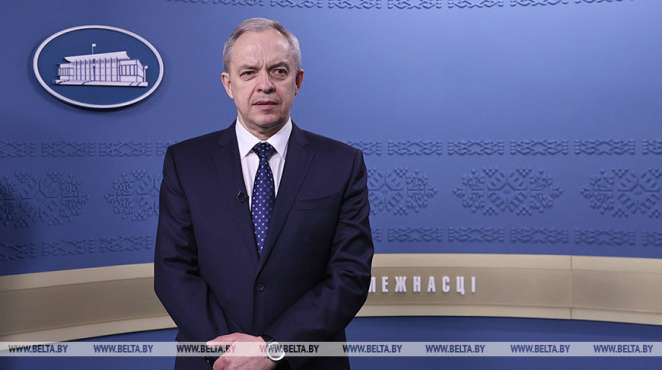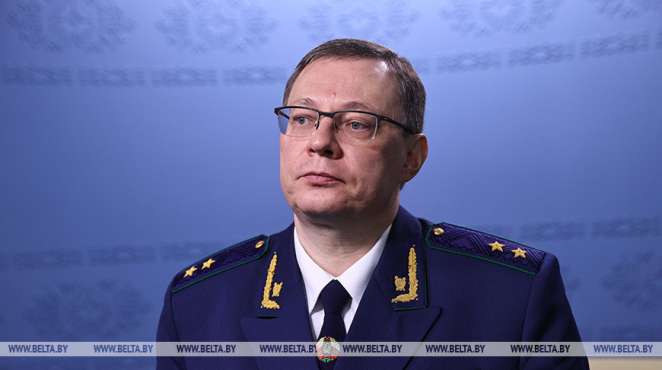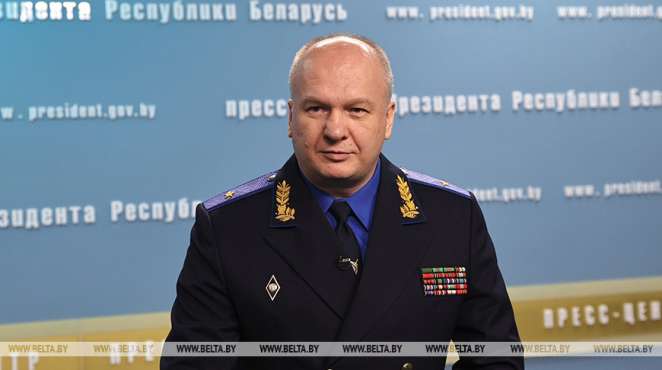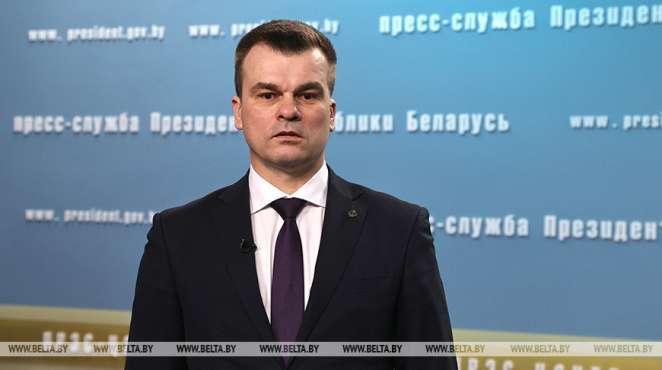Massive revision of Belarusian laws on extremism, law enforcement recounted
BELTA
20 March 2021, 23:52
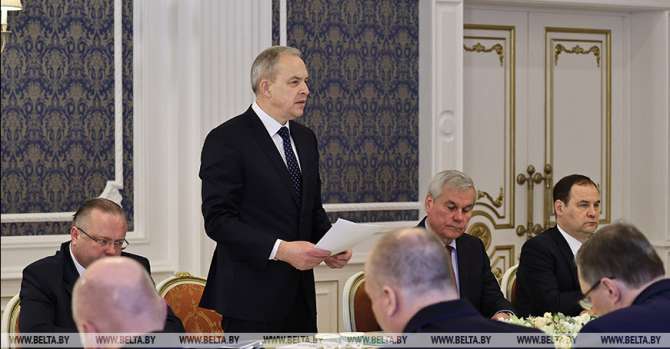 MINSK, 18 March (BelTA) – Work to prepare regulatory acts in the sphere of national security and public order protection has been completed. About ten bills will be forwarded to the parliament soon and will be read during the spring session. Head of the Belarus President Administration Igor Sergeyenko talked to reporters after a government conference hosted by the head of state to explain what legislative initiatives had been prepared, BelTA has learned.
MINSK, 18 March (BelTA) – Work to prepare regulatory acts in the sphere of national security and public order protection has been completed. About ten bills will be forwarded to the parliament soon and will be read during the spring session. Head of the Belarus President Administration Igor Sergeyenko talked to reporters after a government conference hosted by the head of state to explain what legislative initiatives had been prepared, BelTA has learned.
A massive revision of the legislation has been completed. International experience and topical trends were analyzed in the course of development of the proposals. The Belarus President Administration and the State Secretariat of the Security Council set up two working groups. The first one was put in charge of improving the laws on criminal prosecution while the second one coordinated efforts to amend the legislation in the sphere of public security. It is part of the incremental work meant to improve the country's legislation as a whole. Amendments had been previously introduced to the Administrative Offenses Code and the Code of Execution Procedure for Administrative Offences.
Work to comprehensively revise criminal prosecution laws has been finished. In addition to introducing tougher punishments for some offenses some offenses have been decriminalized.
“It is a great layer of problems. The suggested measures are designed to ensure public security taking into account last year's practice,” Igor Sergeyenko said. “Some of the measures are designed to step up protection of the people who ensure this security – personnel of the Interior Ministry, the state administration system, military personnel.”
A number of articles of the Criminal Code have been revised as part of the legislation improvement effort. In particular, some corpus delicti, which do not work or can be used to enforce administrative penalties, have been removed from the Criminal Code.
“On the one hand, some offenses will face tougher punishments, including the violation of laws on mass events. Meanwhile, punishments for a number of other violations will be softened,” Igor Sergeyenko explained.
In particular, suggestions have been made to allow courts to use flexible approaches to the imposition of penalties. For instance, deprivation of freedom can be replaced with curtailment of freedom.
According to Igor Sergeyenko, taking into account international experience plans have been made to strengthen responsibility for tax evasion and introduce considerable, large, and particularly large as terms into the law.
One of the bills is designed to prevent the rehabilitation of Nazism. Igor Sergeyenko pointed out that work on this document has been in progress since last year. Russian experience was also utilized. The document focuses on preventive efforts in order to forestall the rehabilitation of Nazism and the commitment of serious crimes in this sphere. A number of ideological measures are stipulated with this in mind.
Igor Sergeyenko went on saying: “On the whole, all participants of the conference approved of the approaches to legislation revision. Several remarks were made and will be taken into account in the follow-up revision. The head of state said he wanted everything to be addressed, everything to stem from practice. He said he wanted our citizens to be made aware of the laws that will be passed and the responsibility for various offenses in advance.”
Prosecutor General Andrei Shved talked about the initiatives his agency had put forward. Some of them provide for stepping up and clarifying responsibility for extremist actions. “We've analyzed last year's events, took into account the experience of other countries, including the Russian Federation, and prepared the relevant bill,” the prosecutor general said.
In his words, the document clarifies what extremism is. “We are talking about any illegal activity that targets the territorial integrity, the sovereignty of our state, the constitutional system, and public security among other things. The term ‘extremist materials' has been clarified. We are talking not only about information products but any kind of merchandise and symbols used for extremism,” Andrei Shved said.
The authority of a number of government agencies has been expanded, including the prosecution service. Suggestions have been made to empower prosecutors of the oblasts and the city of Minsk to suspend the operation of organizations, which work demonstrates signs of extremism, and empower the prosecutors to petition courts for the liquidation of these organizations. The liquidation procedure has been accelerated.
The Interior Ministry, the KGB as well as the prosecution service will be empowered to issue orders to rectify violations of the law on countering extremism. If such orders are ignored, the operation of legal persons will be ceased.
The Interior Ministry has been entrusted with maintaining a database of persons (legal persons and natural persons), who have been implicated in extremism.
Apart from that, the Criminal Code has been adjusted in order to institute criminal proceedings against people, who commit extremist actions. All kinds of activities that foster extremist actions have been clarified. Those include recruiting, training, preparations, the prosecutor general said. In other words, any kind of activity that is related to extremism will result in an evaluation from the point of view of the criminal law, he noted.
Deputy State Secretary of the Security Council of Belarus Aleksandr Rakhmanov mentioned amendments to labor laws, which are designed to prevent illegal strikes and walkouts. He clarified that the events the amendments focus on do not deserve the term “strike” from the legal point of view.
“As you can see, the events that happened at Belarusian enterprises last year did not have the goals that an industrial action has – the resolution of a labor dispute between an employer and employees. Those events were designed to stir up workers, destabilize the work of enterprises, shut them down, and redivide markets later on. And foreign markets at that where Belarusian products enjoy quite a high demand,” the official explained.
The Belarusian legislation is expected to incorporate additional measures against authors of incorrect information or so-called fake news.
Aleksandr Rakhmanov noted that a number of foreign countries are busy incorporating similar novelties into their laws. He stressed that the distribution of untruthful information under the guise of genuine news is a pressing problem.
“Certainly, Belarusian laws will incorporate additional measures against people, who spread false and untruthful information and dare present it as genuine, verified, and correct. Information about various aspects of our life such as the development of the country, military technical state, the state of risks and challenges to national security, the state of affairs in healthcare, and so on,” he explained.
“Such information can do quite a lot of damage if it is meant to discredit the state and public institutions. It is understandable that there is one goal – to foment intolerance and discontent in the general public that will later result in various other actions – crimes and negative things that we faced in H2 2020,” the deputy state secretary pointed out.
Aleksandr Rakhmanov also mentioned that punishments for the publication of personal data will be greatly increased. Various punishments will be used in response to the collection and distribution of such data and cases when it entails consequences and harm for people.
Fight against the glorification and rehabilitation of Nazism
A bill has been put together to counteract the glorification of Nazism. “We've discussed the bill in detail [during the conference hosted by the head of state]. It is designed to address burning issues,” Andrei Shved said.
According to the prosecutor general, the adoption of the bill will become a serious step in counteracting existing negative phenomena. “We've started seeing attempts, including in mass media and the Internet, to whitewash Nazi criminals, who committed atrocities against the Belarusian people and committed genocide here,” he explained. Apart from that, several months ago the Prosecutor General's Office started work meant to address the matter of opening a criminal case in response to the genocide of the Belarusian people during the Great Patriotic War. “The head of state was informed about it today. This work continues in association with other government agencies, the National Academy of Sciences of Belarus, and archives. The matter will be considered soon,” the prosecutor general said.
In turn, Deputy State Secretary of the Security Council of Belarus Aleksandr Rakhmanov stressed that the Great Patriotic War affected every family: “It is our common pain when millions of people gave their lives to secure the Victory. And the atrocities the enemy committed in our country were truly monstrous.”
In his words, the bill will also contain Belarus' answer to the rehabilitation of Nazism. “We accept no compromises. We fight Nazism and its rehabilitation,” Aleksandr Rakhmanov stressed.
Advocacy and lawyers
Belarusian Justice Minister Oleg Slizhevsky said that amendments concerning the legal profession had been prepared. They are designed to enhance the personnel potential of the legal profession, reinforce the principle of legality in the line of work, and increase the quality and affordability of lawyer services.
Mandatory three-year internship before getting a lawyer license will no longer be necessary. At the same time people, who have considerable experience of work in courts, the law enforcement system, justice bodies, will be able to follow a simplified procedure in order to take qualification exams and become lawyers.
The number of categories and matters, which legal costs the college of advocates will cover for citizens (primarily low-income ones) will be increased.
According to the justice minister, a number of lawyers have overstepped their authority recently. Their actions are in need of an evaluation and have prompted the development of the new legislation. Plans have been made to abolish disciplinary committees and authorize councils of lawyer associations to look into lawyer's failings.
Participants of the government conference hosted by the head of state also discussed the advisability of allowing lawyers to provide services in current organizational forms such as legal advice offices, law offices, and individual lawyers. Suggestions were made to allow lawyers, who work in law offices or on their own, to deal only with civil cases and administrative cases. Lawyers, who belong to legal advice offices, will be able to provide legal services in any cases.
20 March 2021, 23:52

Igor Sergeyenko
A massive revision of the legislation has been completed. International experience and topical trends were analyzed in the course of development of the proposals. The Belarus President Administration and the State Secretariat of the Security Council set up two working groups. The first one was put in charge of improving the laws on criminal prosecution while the second one coordinated efforts to amend the legislation in the sphere of public security. It is part of the incremental work meant to improve the country's legislation as a whole. Amendments had been previously introduced to the Administrative Offenses Code and the Code of Execution Procedure for Administrative Offences.
Work to comprehensively revise criminal prosecution laws has been finished. In addition to introducing tougher punishments for some offenses some offenses have been decriminalized.
“It is a great layer of problems. The suggested measures are designed to ensure public security taking into account last year's practice,” Igor Sergeyenko said. “Some of the measures are designed to step up protection of the people who ensure this security – personnel of the Interior Ministry, the state administration system, military personnel.”
A number of articles of the Criminal Code have been revised as part of the legislation improvement effort. In particular, some corpus delicti, which do not work or can be used to enforce administrative penalties, have been removed from the Criminal Code.
Igor Sergeyenko
“On the one hand, some offenses will face tougher punishments, including the violation of laws on mass events. Meanwhile, punishments for a number of other violations will be softened,” Igor Sergeyenko explained.
In particular, suggestions have been made to allow courts to use flexible approaches to the imposition of penalties. For instance, deprivation of freedom can be replaced with curtailment of freedom.
According to Igor Sergeyenko, taking into account international experience plans have been made to strengthen responsibility for tax evasion and introduce considerable, large, and particularly large as terms into the law.
One of the bills is designed to prevent the rehabilitation of Nazism. Igor Sergeyenko pointed out that work on this document has been in progress since last year. Russian experience was also utilized. The document focuses on preventive efforts in order to forestall the rehabilitation of Nazism and the commitment of serious crimes in this sphere. A number of ideological measures are stipulated with this in mind.
Igor Sergeyenko went on saying: “On the whole, all participants of the conference approved of the approaches to legislation revision. Several remarks were made and will be taken into account in the follow-up revision. The head of state said he wanted everything to be addressed, everything to stem from practice. He said he wanted our citizens to be made aware of the laws that will be passed and the responsibility for various offenses in advance.”
Crackdown on extremism
Prosecutor General Andrei Shved talked about the initiatives his agency had put forward. Some of them provide for stepping up and clarifying responsibility for extremist actions. “We've analyzed last year's events, took into account the experience of other countries, including the Russian Federation, and prepared the relevant bill,” the prosecutor general said.
In his words, the document clarifies what extremism is. “We are talking about any illegal activity that targets the territorial integrity, the sovereignty of our state, the constitutional system, and public security among other things. The term ‘extremist materials' has been clarified. We are talking not only about information products but any kind of merchandise and symbols used for extremism,” Andrei Shved said.
Andrei Shved
The authority of a number of government agencies has been expanded, including the prosecution service. Suggestions have been made to empower prosecutors of the oblasts and the city of Minsk to suspend the operation of organizations, which work demonstrates signs of extremism, and empower the prosecutors to petition courts for the liquidation of these organizations. The liquidation procedure has been accelerated.
The Interior Ministry, the KGB as well as the prosecution service will be empowered to issue orders to rectify violations of the law on countering extremism. If such orders are ignored, the operation of legal persons will be ceased.
The Interior Ministry has been entrusted with maintaining a database of persons (legal persons and natural persons), who have been implicated in extremism.
Apart from that, the Criminal Code has been adjusted in order to institute criminal proceedings against people, who commit extremist actions. All kinds of activities that foster extremist actions have been clarified. Those include recruiting, training, preparations, the prosecutor general said. In other words, any kind of activity that is related to extremism will result in an evaluation from the point of view of the criminal law, he noted.
“Strikes” at enterprises
Deputy State Secretary of the Security Council of Belarus Aleksandr Rakhmanov mentioned amendments to labor laws, which are designed to prevent illegal strikes and walkouts. He clarified that the events the amendments focus on do not deserve the term “strike” from the legal point of view.
“As you can see, the events that happened at Belarusian enterprises last year did not have the goals that an industrial action has – the resolution of a labor dispute between an employer and employees. Those events were designed to stir up workers, destabilize the work of enterprises, shut them down, and redivide markets later on. And foreign markets at that where Belarusian products enjoy quite a high demand,” the official explained.
Fake news and publication of personal data
The Belarusian legislation is expected to incorporate additional measures against authors of incorrect information or so-called fake news.
Aleksandr Rakhmanov noted that a number of foreign countries are busy incorporating similar novelties into their laws. He stressed that the distribution of untruthful information under the guise of genuine news is a pressing problem.
“Certainly, Belarusian laws will incorporate additional measures against people, who spread false and untruthful information and dare present it as genuine, verified, and correct. Information about various aspects of our life such as the development of the country, military technical state, the state of risks and challenges to national security, the state of affairs in healthcare, and so on,” he explained.
Aleksandr Rakhmanov
“Such information can do quite a lot of damage if it is meant to discredit the state and public institutions. It is understandable that there is one goal – to foment intolerance and discontent in the general public that will later result in various other actions – crimes and negative things that we faced in H2 2020,” the deputy state secretary pointed out.
Aleksandr Rakhmanov also mentioned that punishments for the publication of personal data will be greatly increased. Various punishments will be used in response to the collection and distribution of such data and cases when it entails consequences and harm for people.
Fight against the glorification and rehabilitation of Nazism
A bill has been put together to counteract the glorification of Nazism. “We've discussed the bill in detail [during the conference hosted by the head of state]. It is designed to address burning issues,” Andrei Shved said.According to the prosecutor general, the adoption of the bill will become a serious step in counteracting existing negative phenomena. “We've started seeing attempts, including in mass media and the Internet, to whitewash Nazi criminals, who committed atrocities against the Belarusian people and committed genocide here,” he explained. Apart from that, several months ago the Prosecutor General's Office started work meant to address the matter of opening a criminal case in response to the genocide of the Belarusian people during the Great Patriotic War. “The head of state was informed about it today. This work continues in association with other government agencies, the National Academy of Sciences of Belarus, and archives. The matter will be considered soon,” the prosecutor general said.
In turn, Deputy State Secretary of the Security Council of Belarus Aleksandr Rakhmanov stressed that the Great Patriotic War affected every family: “It is our common pain when millions of people gave their lives to secure the Victory. And the atrocities the enemy committed in our country were truly monstrous.”
In his words, the bill will also contain Belarus' answer to the rehabilitation of Nazism. “We accept no compromises. We fight Nazism and its rehabilitation,” Aleksandr Rakhmanov stressed.
Advocacy and lawyers
Belarusian Justice Minister Oleg Slizhevsky said that amendments concerning the legal profession had been prepared. They are designed to enhance the personnel potential of the legal profession, reinforce the principle of legality in the line of work, and increase the quality and affordability of lawyer services.Mandatory three-year internship before getting a lawyer license will no longer be necessary. At the same time people, who have considerable experience of work in courts, the law enforcement system, justice bodies, will be able to follow a simplified procedure in order to take qualification exams and become lawyers.
Oleg Slizhevsky
The number of categories and matters, which legal costs the college of advocates will cover for citizens (primarily low-income ones) will be increased.
According to the justice minister, a number of lawyers have overstepped their authority recently. Their actions are in need of an evaluation and have prompted the development of the new legislation. Plans have been made to abolish disciplinary committees and authorize councils of lawyer associations to look into lawyer's failings.
Participants of the government conference hosted by the head of state also discussed the advisability of allowing lawyers to provide services in current organizational forms such as legal advice offices, law offices, and individual lawyers. Suggestions were made to allow lawyers, who work in law offices or on their own, to deal only with civil cases and administrative cases. Lawyers, who belong to legal advice offices, will be able to provide legal services in any cases.
